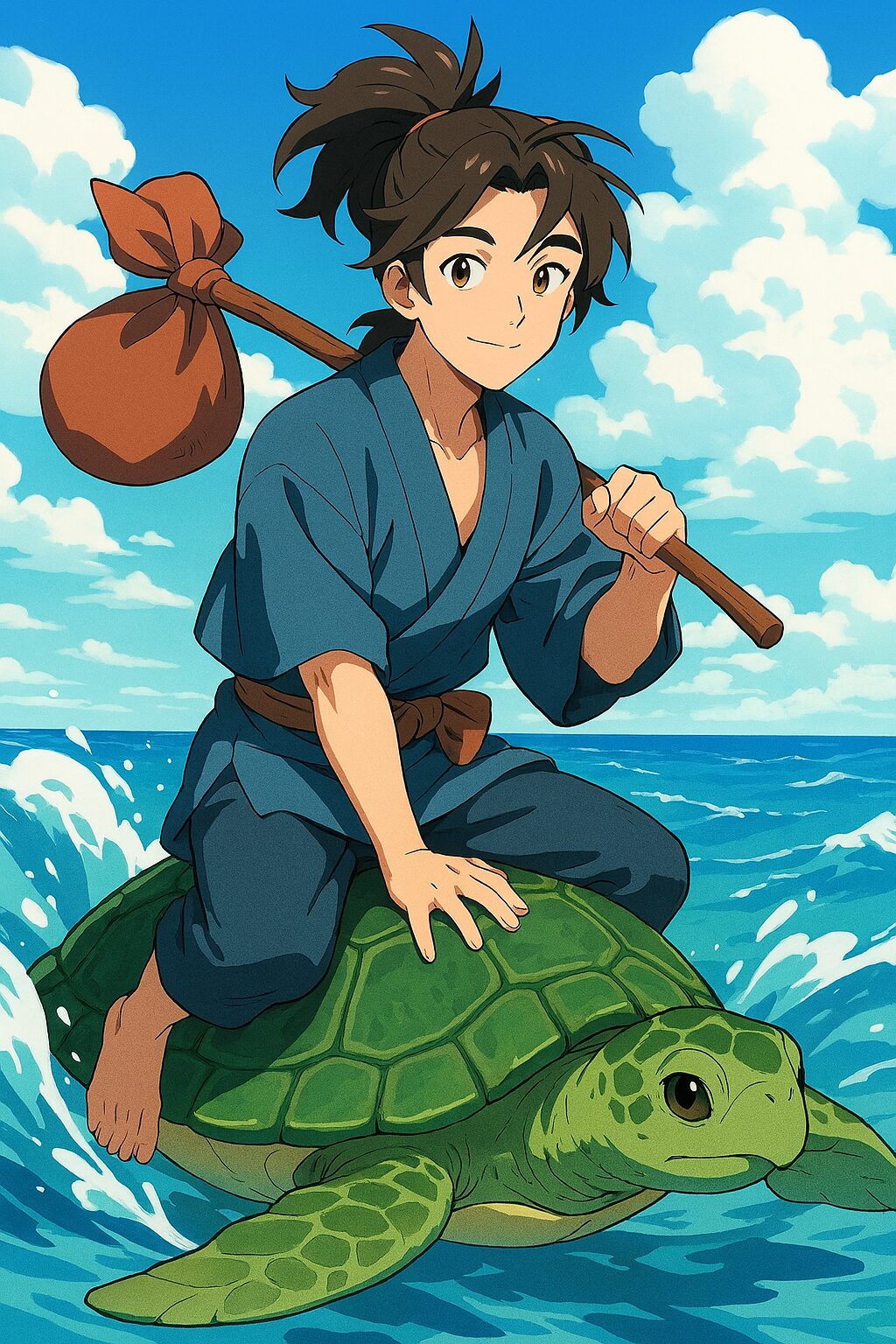- Introduction: Welcome to the World of Japanese Folktales
- Chapter 1: The Boy and the Turtle
- Chapter 2: The Palace Beneath the Sea
- Chapter 3: Days of Delight
- Chapter 4: The Decision to Return
- Chapter 5: Time Lost and the Secret of the Box
- Lessons and Cultural Insights
- Conclusion: A Tale That Transcends Borders
- はじめに:日本の昔話の世界へようこそ
- 第一章:亀との出会い
- 第二章:海の底の竜宮城へ
- 第三章:夢のような日々
- 第四章:帰郷の決意
- 第五章:時の流れと玉手箱の秘密
- 教訓と文化的背景
- まとめ:浦島太郎は世界に通じる物語
Introduction: Welcome to the World of Japanese Folktales
Japan is home to countless folktales passed down through generations. Among them, “Urashima Tarō” stands out as a story rich in themes of kindness, time, promises, and impermanence. This article presents the full narrative in English, designed for international readers to enjoy and understand the cultural depth behind the tale.
Chapter 1: The Boy and the Turtle
Long ago, in a seaside village, lived a kind-hearted young fisherman named Urashima Tarō. He lived modestly, supporting his parents through daily fishing.
One day, while walking along the shore, Tarō saw a group of children tormenting a small turtle. They poked it with sticks and buried it in sand, laughing as the turtle struggled.
“Hey now, don’t be cruel to the turtle. Let it go,” Tarō said gently.
He persuaded the children to stop and even paid them to release the turtle. Holding it carefully, he returned it to the sea. The turtle looked back once, then disappeared beneath the waves.
Chapter 2: The Palace Beneath the Sea
A few days later, while fishing, Tarō was approached by a large turtle.
“Urashima Tarō, I am the turtle you saved. As thanks, I invite you to the Dragon Palace beneath the sea.”
Surprised but curious, Tarō climbed onto the turtle’s back and dove into the ocean. The underwater world was dazzling—sunlight filtered through the waves, and coral shimmered in vibrant colors.
They arrived at Ryūgū-jō, the Dragon Palace, where fish danced and seashell doors opened to reveal a beautiful princess named Otohime.
“Thank you for saving the turtle. Please enjoy your stay,” she said warmly.
Chapter 3: Days of Delight
At Ryūgū-jō, Tarō was treated to splendid feasts and mesmerizing performances by sea creatures. He was shown magical doors that revealed the four seasons—spring to the east, summer to the south, autumn to the west, and winter to the north.
Time seemed to stand still as Tarō enjoyed the wonders of this enchanted realm.
Chapter 4: The Decision to Return
Eventually, Tarō began to miss his family and hometown.
“I wonder how my parents are doing…” he murmured.
Seeing his sorrow, Otohime said, “If you must go, please take this tamatebako—a jeweled box. But promise me: never open it.”
Tarō accepted the box, climbed onto the turtle’s back once more, and returned to the shore.
Chapter 5: Time Lost and the Secret of the Box
Back on land, Tarō was shocked. His village had changed completely. The houses, the people—everything was unfamiliar. No one knew the name Urashima Tarō.
“How could this be? I was only gone a few days…”
Confused and desperate, he opened the tamatebako, forgetting his promise.
A cloud of white smoke emerged, and in an instant, Tarō aged into an old man. Time in Ryūgū-jō had passed differently—hundreds of years had gone by on land.
Lessons and Cultural Insights
- Good deeds are rewarded: Saving the turtle led to a magical journey.
- Promises matter: Breaking his vow brought irreversible consequences.
- The fleeting nature of time: Joy is temporary, and change is inevitable.
This concept of impermanence, known in Japanese as mujō, is rooted in Buddhist philosophy and deeply embedded in Japanese culture.
Learn more about Urashima Tarō on Wikipedia (Japanese)
Educational value of the story (Japanese)
Conclusion: A Tale That Transcends Borders
Urashima Tarō is a story that resonates across cultures. Its themes of kindness, consequence, and the passage of time are universal.
- Kindness and reward
- Promises and their weight
- The bittersweet nature of time
If you’re curious about more Japanese folktales, explore the full series below.
Japanese Folktale Series (external link)
🐢 海外読者向け|浦島太郎:時を超えた海の旅
はじめに:日本の昔話の世界へようこそ
日本には、古くから語り継がれてきた「昔話」が数多く存在します。その中でも「浦島太郎」は、善行、時間、約束、そして無常観を描いた深い物語です。今回は、海外の読者にもわかりやすく、物語の世界に入り込めるよう、ストーリー形式でご紹介します。
第一章:亀との出会い
むかしむかし、ある海辺の村に浦島太郎という心優しい青年が住んでいました。彼は漁師として毎日海へ出て、両親を養いながら慎ましく暮らしていました。
ある日のこと、太郎が浜辺を歩いていると、子どもたちが一匹の小さな亀をいじめているのを見かけました。棒で突いたり、砂に埋めたり、亀は苦しそうに身をよじっていました。
「これこれ、亀をいじめるなんてかわいそうだろう。放してやりなさい」
太郎は子どもたちを諭し、亀を買い取って海へ返してやりました。亀は太郎の手の中で小さく首を動かし、静かに海へと帰っていきました。
第二章:海の底の竜宮城へ
それから数日後、太郎が漁をしていると、海から一匹の大きな亀が現れました。
「浦島太郎さん、私はあなたに助けられた亀です。お礼に竜宮城へご案内いたします」
太郎は驚きながらも亀の背に乗り、海の中へと潜っていきました。水の中は青く澄み、光が差し込む幻想的な世界。やがて、珊瑚に囲まれた美しい宮殿が現れました。
そこは「竜宮城」。魚たちが舞い踊り、貝殻の扉が開くと、乙姫という美しい姫君が太郎を迎えてくれました。
「浦島太郎さん、亀を助けてくださってありがとうございます。どうぞごゆっくりお過ごしください」
第三章:夢のような日々
竜宮城では、タイやヒラメ、タコなどの魚たちが踊りを披露し、豪華な料理が次々と運ばれてきました。太郎は夢のような時間を過ごし、季節の景色が見える不思議な扉を案内されました。
東の扉を開けると春、南は夏、西は秋、北は冬。竜宮城には四季が同時に存在していたのです。
太郎はその美しさに心を奪われ、時間の流れを忘れてしまいました。
第四章:帰郷の決意
やがて太郎は、ふと故郷のことを思い出します。
「父さんや母さんは元気だろうか…」
その様子を見た乙姫は、悲しそうな顔で言いました。
「浦島さん、どうしてもお帰りになるのですね。ではこの玉手箱をお持ちください。けれど、決して開けてはなりません」
太郎は玉手箱を受け取り、亀の背に乗って地上へ戻りました。
第五章:時の流れと玉手箱の秘密
浜辺に戻った太郎は、村の様子がすっかり変わっていることに気づきます。家も人も、何もかもが見知らぬもの。誰に尋ねても、浦島太郎という名を知る者はいません。
「どうしてだ…ほんの数日しか竜宮城にいなかったのに…」
太郎は混乱し、ついに乙姫との約束を破って玉手箱を開けてしまいます。
すると、中から白い煙が立ち上り、太郎の体は一瞬で白髪の老人へと変わってしまいました。
竜宮城で過ごした時間は、地上では何百年もの時を超えていたのです。
教訓と文化的背景
- 善行は報われる:亀を助けたことで竜宮城へ招かれる。
- 約束を守ることの大切さ:玉手箱を開けたことで太郎は老人になってしまう。
- 時間の儚さと無常観:楽しい時間は一瞬で過ぎ去り、現実は変わってしまう。
この「無常(むじょう)」という考え方は、日本文化の根底にある仏教的思想であり、すべてのものが移り変わるという認識です。
まとめ:浦島太郎は世界に通じる物語
浦島太郎は、日本人の心に深く根付いた物語でありながら、海外の読者にも共感される要素がたくさんあります。
- 善行と報酬
- 約束とその結果
- 時間と人生の儚さ
日本文化に興味がある方は、ぜひ他の昔話も読んでみてください。



コメント